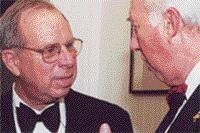
Philip Merrill speaks with university President Dan Mote. Merrill’s family ruled his death a suicide Monday.
The discovery of Philip Merrill’s body on Monday has brought new light into his disappearance and death, with his family now indicating the late publisher committed suicide.
Merrill, whose body was found floating in the Chesapeake Bay, was previously believed to have died in a sailing accident when his boat, the Merrilly, went missing on June 10.
In a statement released Tuesday by Merrill’s family, the man who donated $10 million to the university’s journalism school – which now bears his name – had showed signs of being “fatigued and unmotivated” and his “spirit had dimmed” since he underwent heart surgery over a year ago.
The Maryland Natural Resource Police, who are leading the investigation into Merrill’s death, would not return several calls, but The Washington Post reported yesterday Merrill was found tied to a small anchor and had what appeared to be a shotgun wound to his head. It was reported that Merrill, 72, recently purchased a shotgun.
“We were concerned for his welfare but never imagined that he would consider taking his own life,” the family’s statement said. “Unfortunately, with the same resolve and single-mindedness that made him so effective as an executive, he appears to have made his decision to carry out his actions with tragic consequences.”
Dr. Douglas L. Wood of the Mayo Clinic in Minnesota said the characteristics displayed by Merrill after his surgery were not unusual. He said depression after a heart attack or bypass surgery is a well-known side effect and the medicine a patient takes can also cause similar problems.
According to Wood, the change in Merrill’s attitude may have also been caused by the physical trauma the brain endures during bypass surgery, caused by a pump used to take control of the heart and lungs during the surgery.
Only half of patients who undergo bypass surgery return to work, and most live a substantially altered lifestyle, Wood said.
Merrill, who was an assistant secretary general to NATO in the 1990s, was also the owner and publisher of several area publications, including Washingtonian magazine and The Capital. He continued to be active in his duties after his surgery.
“If there are limitations imposed on a person, particularly a successful person, [the surgery] has a devastating effect for those people and often leads to depression,” Wood said.
Friends and colleagues of Merrill said they are shocked by the way he died but will not let the circumstances of his death change how they view him.
“If he killed himself, why he killed himself, that doesn’t impact what he did in his life,” said Steve Crane, assistant dean of the university’s journalism college. “What remains is his generosity and his legacy. It’s what we should be thinking about.”
“Phil lived his life openly and honestly. In this spirit, particularly out of respect for friends and colleagues, we feel his last actions must be understood for what they were,” the family’s statement said. “Everyone who knew Phil had no doubt that he loved life and lived it to the fullest. We ask everyone to remember him as we will – for the first amazing 71 years of his life.”
Contact reporter Owen Praskievicz at praskieviczdbk@gmail.com.



